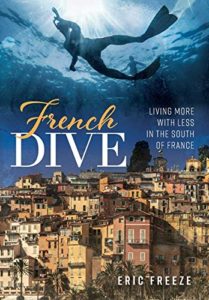 Guest post by Eric Freeze.
Guest post by Eric Freeze.
The first time I came to Nice, France was as a missionary in the fall of 1993. It was my “blue ville,” a term LDS missionaries in France used to describe their first area. Blue was the French equivalent of Green. A “blue” was a young army recruit, a designation that came from the French Revolutionary war. Before the war, soldiers wore white, the color of the monarchy. After the Convention of 1793, the new republic mandated that soldiers wear blue. The only problem was that the republic couldn’t afford to change the whole military at once. So new recruits donned the blue uniforms, marking their inexperience that frequently made them the object of ribbing and ridicule from senior officers.
My blueness never stood out much in my new area. My first companion spoke such horribly-accented French that often people would turn to me to decipher what he was saying. I am Canadian and although I still had trouble keeping up my first couple months, I understood and spoke more than most greenies. When my first companion was transferred, I ended up with Elder Loftin Harvey III, son of Loftin Harvey Jr. who was mistakenly excommunicated from his French mission during the William Tucker apostasy in 1958. Loftin Harvey Jr. eventually married a Nicoise woman who had converted to Mormonism: Roseline Bousquainaud. The Bousquainauds had deep roots in Nice and as Loftin’s companion, I found myself suddenly a part of an extended traditional French family. Instead of feeling like a newbie, the butt of jokes by senior missionaries, I started off my mission with a profound sense of belonging.
None of this information is in my recently-released memoir, French Dive: Living More with Less in the South of France. On the contrary, the title seems to position the book in the market as one of those bucolic French lifestyle books, only this time calibrated to a large family trying to integrate into France on the cheap. We bought an apartment in need of renovation and the book loosely covers that first year of pinching centimes and living the French principle of les décroissants, a movement similar to minimalism built around ideas of consuming less, living sustainably, and prioritizing experience over things. I don’t talk about our local ward or my Eldest daughter’s baptism, nor the friends who have remained from my years as a blue. I don’t talk about the awkward celebrity of being a missionary who returns to his blue ville over and over till he decides to settle there permanently. Instead, I talk about the challenges of soccer tryouts for six-year-olds and saving money by spearfishing for food. I talk about our family as immigrants, the blonde, blue-eyed foreigners who will never be Niçois even as they speak French and go to public schools.
So why bring it up? I am an active LDS author who has written about my faith in the past. But how do I write about a place with so many stereotypes associated with it, the French Riviera with its luxury yachts and gambling casinos and night life and beaches? It’s the playground of the rich and famous, with nearby Cap Ferrat and Monaco becoming some of the most exclusive communities in the world. My memoir already stands in contrast to what people expect for an immigrant family of six. And even as I drafted chapter after chapter about my LDS background in the south of France, that wasn’t yet the story that I wanted to tell. As I honed in on my message, how best to live with others in a fractured world divided by markers of race, religion, and socioeconomic status, I knew that those chapters would be too much of a diversion, that they wouldn’t make the cut.
The reason I mention it now is to prepare you, dear reader, for a book that I hope still resonates with an LDS audience. For at its heart, French Dive is a profoundly LDS book. It’s a book that celebrates family, that seeks common ground, that questions the institutions that subtly govern our lives. It’s also a book about what it means to belong to a community, that shows how a place opens up to newcomers the more that you give to it. But with this added context, I hope you’ll understand what this place means to me, why it’s not just a glamorous background for a story of bilingual integration. Instead, it’s a book that celebrates the closest place that me and my family has ever come to home.
 Eric Freeze is an Associate Professor at Wabash College. He is the author of the short story collection Dominant Traits (2012), the essay collection Hemingway on a Bike (2014 AML Creative Nonfiction Award winner), and the short story collection Invisible Men (2016 AML Short Fiction Award finalist). He lives in Crawfordsville, Indiana and Nice, France with academic Rixa Freeze and their four children.
Eric Freeze is an Associate Professor at Wabash College. He is the author of the short story collection Dominant Traits (2012), the essay collection Hemingway on a Bike (2014 AML Creative Nonfiction Award winner), and the short story collection Invisible Men (2016 AML Short Fiction Award finalist). He lives in Crawfordsville, Indiana and Nice, France with academic Rixa Freeze and their four children.
Book testimonials:
“French Dive is one of the best travel memoirs I’ve ever read. It’s as intellectually enlightening as Adam Gopnik’s Paris to the Moon, and it has all the emotional impact of a novel. This is a moving meditation on contemporary life and a testament to the importance of exploration and discovery.”
–Michael Dahlie, author of A Gentleman’s Guide to Graceful Living
At the warm heart of this enchanting book are answers to one of the most fundamental questions of life: how to live well. Eric Freeze and his family moved from the US into a tiny apartment in Nice—and into new lives centered around family, food, discovery, and living boldly. As the French say: depenser moins, vivre mieux: spend less, live better.
–Anne Giardini, author of The Sad Truth About Happiness and Advice for Italian Boys
Eric Freeze makes for an extraordinary travel companion and French Dive is the kind of read that spirits you from one location to another but leaves you ready for your next adventure. What Freeze is capable of doing, with his keen eye and even more impressive ability to examine people and cultures, is nothing thing short of incredible.
–Jared Yates Sexton, author of The People Are Going to Rise Like the Waters on Your Shore: A Story of American Rage
–The motto of the French who call themselves les décroissants: ‘spend less, live better,’ permeates this story of faith, dedication, life goals realized on a shoestring budget, and where there’s a will there’s a way. In these pages you will fall in love with Nice, spearfishing, and the family Freeze. You’ll ponder how to make what’s right for you and what’s right for the world coincide.
Pam Houston, author of Deep Creek: Finding Hope in the High Country
